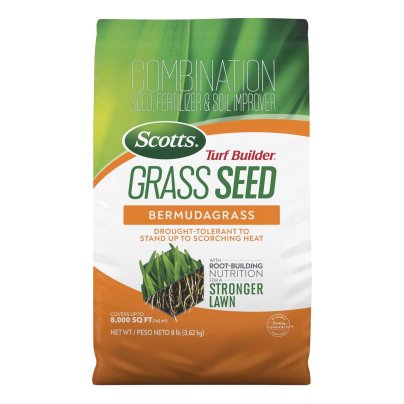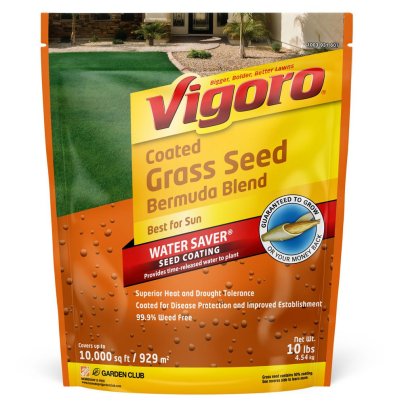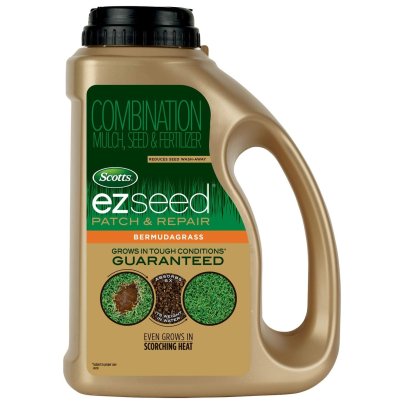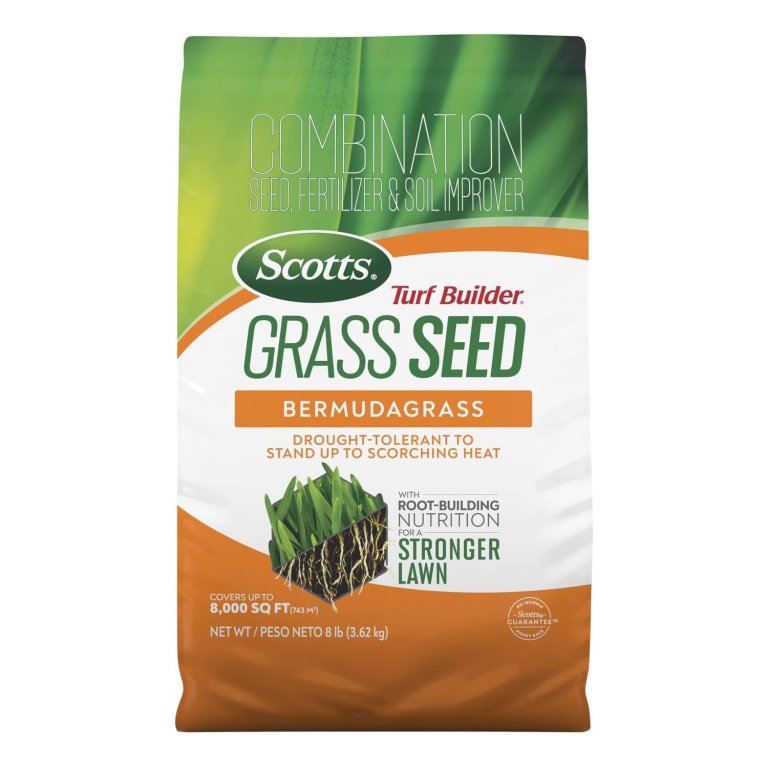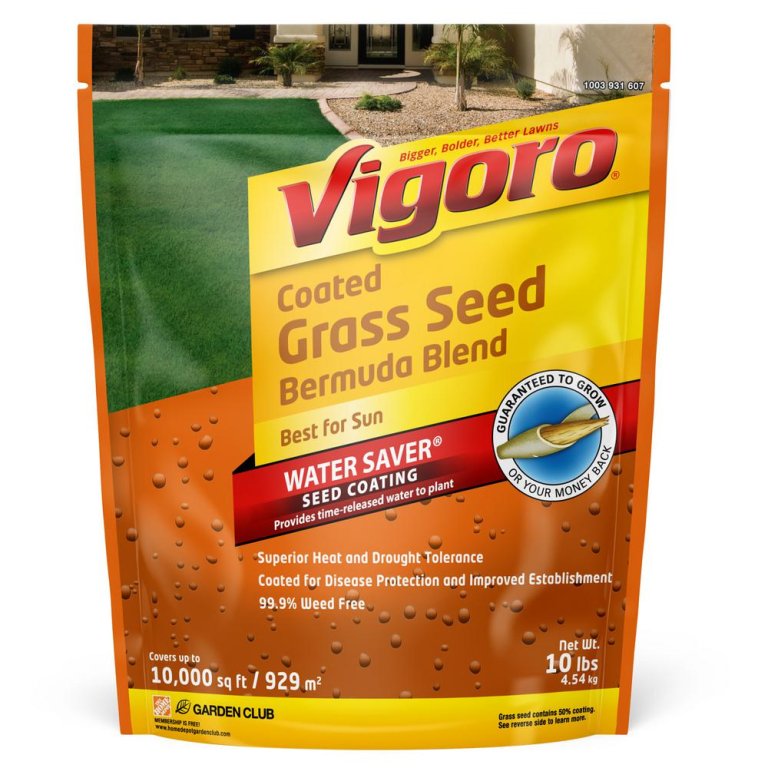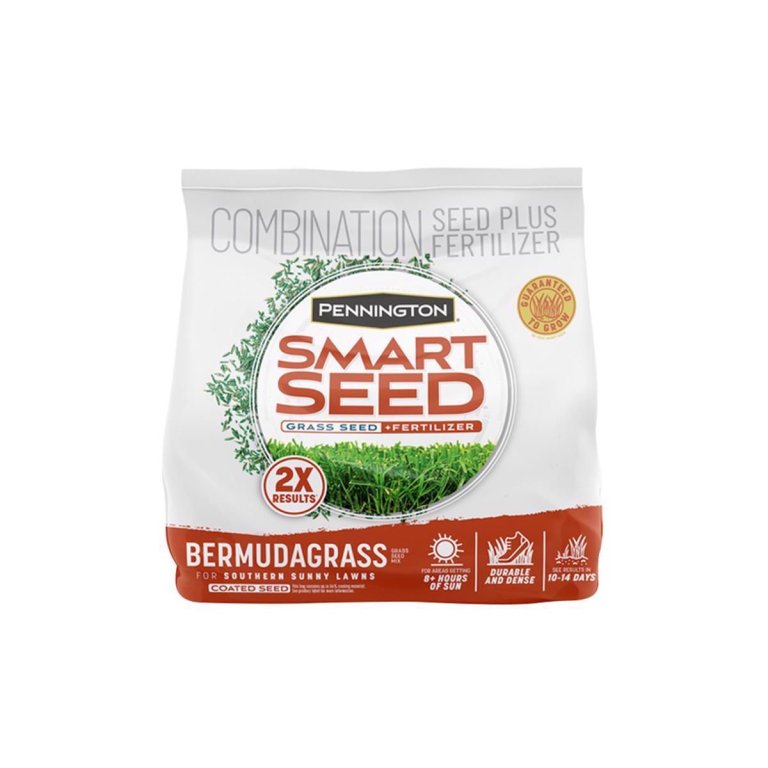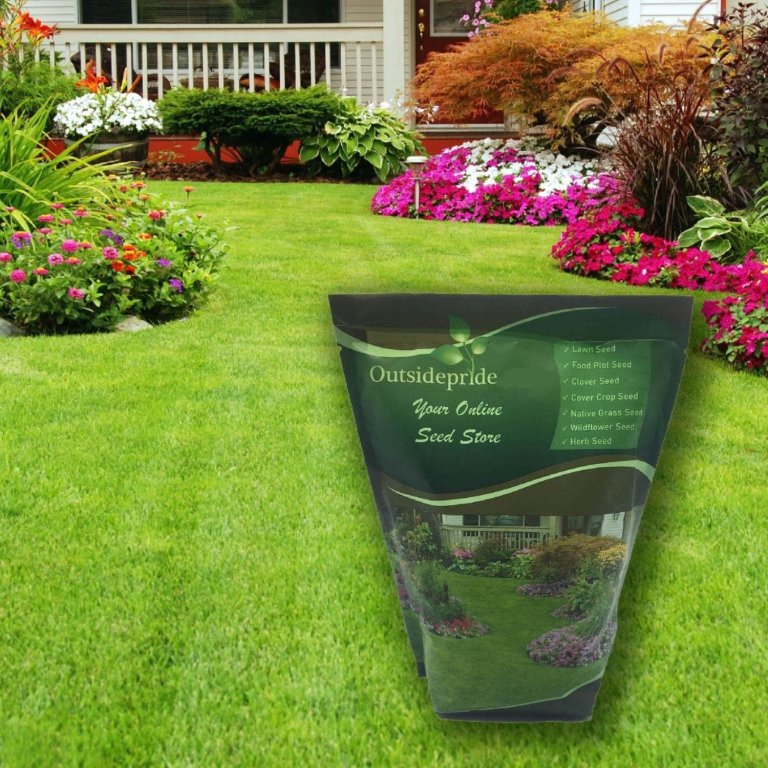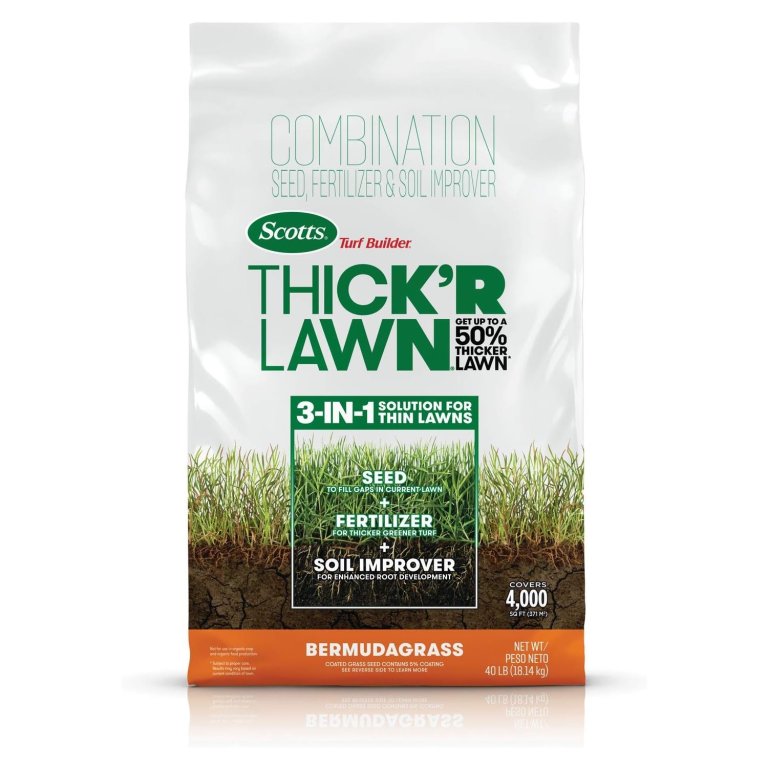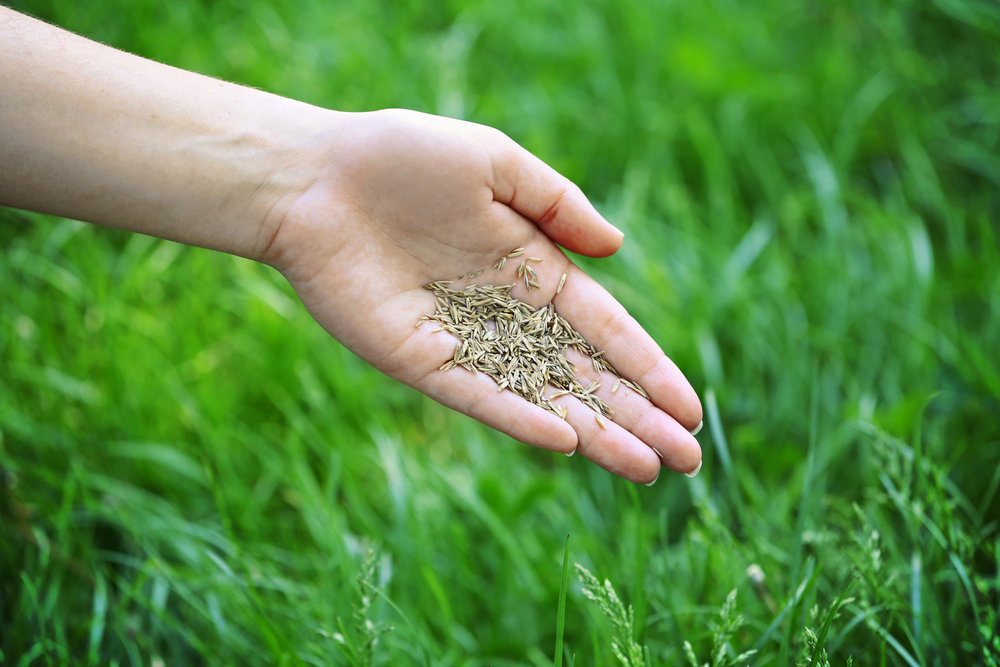
We may earn revenue from the products available on this page and participate in affiliate programs. Learn More ›
Bermuda grass is a popular choice for turfgrass applications, and an abundant lawn starts with the right seed. It is resilient and forgiving, and in the right growing conditions, it can create a low-maintenance but thick and uniform lawn. These qualities make it a top choice for home lawns, golf courses, parks, and athletic fields.
With a wide variety of seed types available, choosing the right type for your lawn can feel overwhelming. Read on to learn more about the factors to consider when seeding new grass, and explore the best Bermuda grass seed options for a low-maintenance and beautiful lawn.
- BEST OVERALL: Scotts Turf Builder Grass Seed Bermudagrass
- BEST BANG FOR THE BUCK: Vigoro Bermuda Grass Seed Blend
- BEST FOR PATCH REPAIR: Scotts EZ Seed Patch & Repair Bermudagrass
- BEST LOW-MAINTENANCE: Pennington Smart Seed Bermuda Seed and Fertilizer
- BEST HYBRID: Outsidepride Full House Bermuda Grass Seed Blend
- ALSO CONSIDER: Scotts Turf Builder Thick’R Lawn Bermudagrass
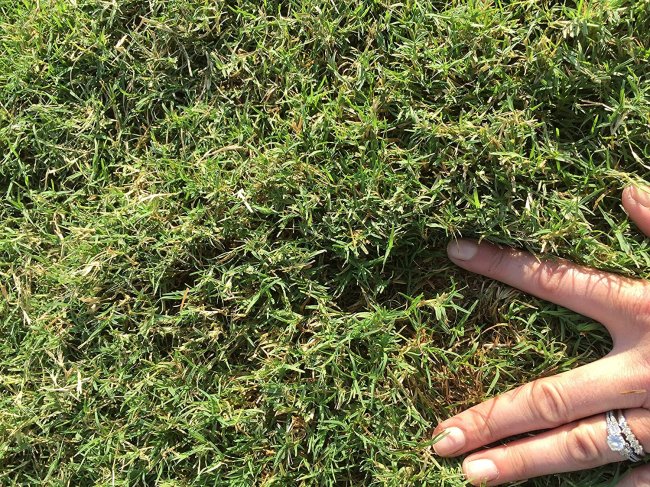
How We Chose the Best Bermuda Grass Seed
Growing Bermuda grass from seed is simple and, in the right conditions, will result in a lush and affordable lawn. A good lawn always starts with high-quality seeds. Through product research and consulting consumer reviews, we chose seed products that are reliable and easy to grow.
We noted coverage area, germination time, and maintenance expectations. Most homeowners want a beautiful lawn relatively quickly, so we chose hulled seeds. Many of the products we chose have beneficial coatings, which give gardeners the satisfaction of fast germination plus the benefits of the added coating, such as better water retention, disease resistance, and added nutrients for growth. To ensure good coverage and satisfaction year-round, we included various grass types and blends, giving more color, texture, and growing time flexibility.
Our Top Picks
High-quality grass seeds are simple to plant and can be trusted to grow reliably. Sow a thick and attractive lawn with the best Bermuda grass seed products ahead.
Best Overall
Scotts Turf Builder Grass Seed Bermudagrass
Pros
- Provides a beneficial WaterSmart PLUS coating that jump-starts seedlings, protects them, and effectively absorbs water
- Offers ample quantity for covering large lawns and sports fields or multiple applications
- Withstands heat and sun exposure; suitable for southern states
Cons
- Not marketed as weed-free; users may need additional products for weed-prone areas
Product Specs
- Type: Seeded
- Coverage area: 5 pounds of seed for 5,000 square feet for adding to existing lawn; 1,665 square feet for new lawncoverage
- Germination time: 5 to 12 days
Scotts Turf Builder Grass Seed Bermudagrass is an excellent choice for quickly growing a full, green lawn. This hulled seed spreads aggressively to create a thick and durable lawn. Seeds can begin to grow in as few as 5 to 12 days, making this product ideal for those who want fast results.
Part of the robust growth is because of this seed’s Scotts 4-in-1 WaterSmart Plus coating. This coating protects against diseases, keeps seed moist up to two times longer than uncoated seed, and has nutrients to jump-start growth.
This coating gives lawns an excellent start to their lush, green life. Once grown in, Scotts Bermuda grass seed results in a fine-bladed, robust lawn that stands up to scorching heat and drought conditions.
Get the Scotts Turf Builder Bermudagrass grass seed at Amazon, Lowe’s, The Home Depot, or Target (4-pound bag).
Best Bang for the Buck
Vigoro Bermuda Grass Seed Blend
Pros
- 99.9 percent weed-free formula keeps broadleaf weed varieties at bay
- Coating provides each seed with ample absorption; 6 times more absorbent than uncoated seeds
- Nutrients and fungicides are included in the formula to aid growth and protection from disease
- Comes with high heat, foot traffic, and drought resistance; suitable for application in southern states
Cons
- Longer germination time compared to other options on the market; can take up to 4 weeks
Product Specs
- Type: Seeded
- Coverage area: 10 pounds of seed for 10,000 square feet for adding to existing lawn; 5,000 square feet (for new lawn coverage)
- Germination time: 14 to 21 days
Though this seed from Vigoro is budget-friendly, it still has several beneficial qualities that help grow a beautiful Bermuda grass lawn. For starters, this grass seed is 99.9 percent weed-free so you can sow a beautiful, grassy lawn without worrying about extra weeding.
To encourage grass health during the vulnerable early stages, each seed has a coating that retains up to six times more water than uncoated seeds. This keeps seeds moist, allowing them to gradually release water while they get established. The coating also includes added nutrients and a fungicide to boost growth and protect from disease. The resulting grass is a medium green and has a fine texture.
Vigoro recommends this bulk Bermuda grass seed for sunny areas. Its high drought, heat, and foot-traffic tolerance makes it an excellent choice for large residential lawns; this 10-pound bag can cover up to 10,000 square feet.
Get the Vigoro Bermuda grass seed at The Home Depot.
Best for Patch Repair
Scotts EZ Seed Patch & Repair Bermudagrass
Pros
- Grows in tough conditions, including high heat, dry soil types, high-traffic spots, and slopes and hills
- Fills in brown patches within a few weeks; can start growing in just 10 days
- Contains mulch, fertilizer, a tackifier, and a protectant for excellent versatility
Cons
- Only for patching; won’t cover an entire lawn
Product Specs
- Type: Patch repair
- Coverage area: 20 pounds of seed for 445 square feet
- Germination time: 10 to 30 days
A patchy lawn can result from several causes, including disease, insects, pet urine, and foot traffic. While they look unsightly, patches are fixable. Scotts EZ Seed Patch & Repair Bermudagrass is a convenient fix for those annoying brown and yellow patches.
This grass seed is made to grow in tough conditions, including in scorching heat, sloped ground, and dry and high-traffic areas. It contains Bermuda grass seed, mulch, fertilizer, tackifier, and a protectant. The mulch helps keep the seed moist, and the tackifier keeps it in place so it doesn’t get washed away. Fertilizer jump-starts the seedling’s growth while keeping it safe from disease due to the protectant. This allows the seed to grow into patches that were previously damaged, filling in patches with fresh, verdant grass.
Get the Scotts EZ grass seed at Amazon (3.75-pound container), Lowe’s (20-pound bag), Tractor Supply Co. (10-pound bag), The Home Depot (20-pound bag), or Target (10-pound bag).
Best Low-Maintenace
Pennington Smart Seed Bermuda Seed and Fertilizer
Pros
- Cool-season and Bermuda grass blend is suitable for northern states
- Fertilizer coating aids in grass growth while preventing weeds from growing
- Low-growing grass for fewer grass clippings and after-mowing cleanup
Cons
- Requires 8 or more hours of sun per day for proper growth
Product Specs
- Type: Seeded
- Coverage area: 8.75 pounds of seed for 5,000 square feet if adding to existing lawn; 2,500 square feet for new lawn coverage
- Germination time: 10 to 14 days
Pennington Smart Seed Bermuda grass and fertilizer has several additions to create a low-maintenance and healthy lawn. It includes a fertilizer to help lawns grow in strong and crowd out any straggling weeds. The fertilizer coating contains a calcium nitrate enhancement for a faster-growing, greener lawn.
This Smart Seed mix also includes a temporary cool-season grass. This grass grows in quickly to provide stability and early color, which results in faster germination and quicker establishment compared to planting Bermuda grass alone.
This grass seed creates a lawn that loves to bask in sunshine—Pennington recommends 8 hours or more each day for the best lawn. The resulting grass is a low-growing blend, designed to produce fewer grass clippings. It also has great heat, drought, and traffic tolerance, making it ideal for families who love to use their lawn.
Get the Pennington Bermuda grass seed at Lowe’s, Ace Hardware, The Home Depot, or Target (1.75-pound bag).
Best Hybrid
Outsidepride Full House Bermuda Grass Seed Blend
Pros
- Made with a Hollywood and Monaco mix for traffic tolerance and a lush, dark green color
- Comes in multiple quantities to accommodate various lawn sizes or for several applications
- Excellent tolerance in cold temperatures; can be used in northern states
Cons
- Pricey compared to other options on the market
- Not suitable for application on putting greens
Product Specs
- Type: Seeded hybrid
- Coverage area: 1 pound for approximately 500 square feet (for new lawn coverage)
- Germination time: 7 to 14 days
Hybrid Bermuda grasses attempt to enhance the beneficial qualities of common Bermuda grass. Arden 15 Hybrid Bermuda Grass Seed is an excellent example of this type of improvement.
Arden 15 is the successor to Princess 77, considered by many to be the first fine-textured hybrid Bermuda grass in seeded form. It has many qualities similar to those of the Princess 77 variety, including excellent sun, drought, and traffic tolerance, outstanding density and cover, a gorgeous dark green color, and a fine texture.
The Arden 15 grass seed has even better cold tolerance and faster grow-in than the Princess 77 variety. This grass seed creates a very uniform turf, ideal for lawns, golf courses, and parks and comes in multiple quantities to accommodate small to large lawn varieties.
Get the Outsidepride Bermuda grass seed at Amazon.
Also Consider
Pennington Seed 1 lb Bermuda Grass Seed
Pros
- The 3-in-1 formula comes with a seed, fertilizer, and soil improver; should provide a 50 percent thicker lawn in 1 application
- Fills in gaps or provides an overall thicker lawn appearance for excellent versatility
- Comes in multiple quantity options depending on the space required for seeding
Cons
- Requires daily watering for 2 weeks after application
Product Specs
- Type: Seeded
- Coverage area: 4,000 square feet
- Germination time: 14 days
For a thicker, more luscious Bermuda lawn, trust in Scotts Turf Builder Thick’R Lawn. Made with a seed, fertilizer, and soil improver, this option is formulated to make lawns 50 percent thicker with just one application and can be used for reseeding as well as new plantings.
Though it comes in a few sizes, the 40-pound bag can cover over 4,000 square feet, making it ideal for multiple applications or large lawn spaces. But, this three-in-one grass seed should be applied when the temperature outside reaches 65 degrees Fahrenheit. Water daily for 2 weeks to ensure proper growth.
Get the Scotts Turf Builder Thick’R Bermuda grass seed at Amazon, Lowe’s (12-pound bag), Tractor Supply Co., or The Home Depot.
Jump to Our Top Picks
What to Consider When Choosing Bermuda Grass Seed
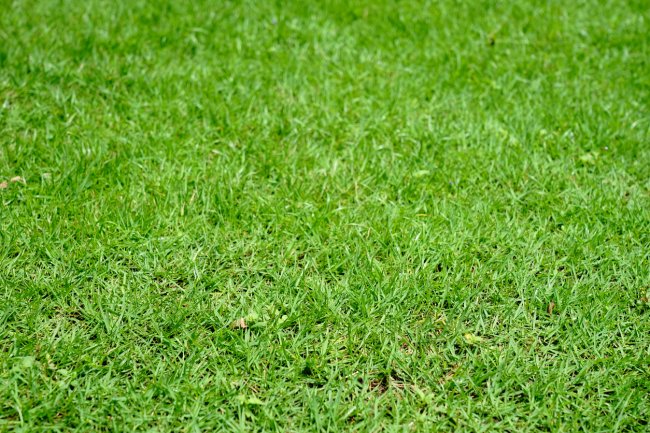
There are several factors to consider when seeding a new lawn. When choosing a new grass seed, consider aesthetics, texture, and stress resistance. Your geographic zone, lawn location and usage, desired germination time, and desired color and texture can all influence your choice of Bermuda grass seed.
Types of Bermuda Grass
There are many types of Bermuda grass, and different varieties can have distinct features, like texture, color, and levels of tolerance to stressors. Many seed bags don’t display the specific Bermuda grass type, but it is beneficial to know the difference between the two main categories: seeded and hybrid Bermuda grasses.
Seeded
Seeded Bermuda grasses include those typically grown from seeds. Growing Bermuda grass from seed is cheaper, offers plenty of grass type choices, and is less labor-intensive to install.
There are several seeded Bermuda grass varieties, including the commonly used, original seed types, aptly named the common Bermuda grasses. These grasses are among the most popular turf grasses used in the southern United States since they are attractive, low-maintenance, and tolerant of drought and foot traffic.
In general, common Bermuda grasses can pretty easily bounce back from a range of stressors, including heat, traffic, drought, and sea salt spray. But if you’re looking for a grass with specific traits, consider a hybrid grass.
Hybrid
Hybrid Bermuda grasses are a mix of common Bermuda grass and another type of grass. These hybrid grasses are almost entirely sold as sod rather than seed.
Hybrid Bermuda grasses are created to blend desired traits of certain grass types. Desired traits can include better tolerance against disease, pests, and traffic or better shade tolerance. Hybrid Bermuda grasses may also help achieve a certain color or texture.
Installing sod is generally more expensive and time-intensive than seeding. Hybrid Bermuda grasses are often chosen for their superior characteristics. However, that can also come at a price, so they’re generally used for golf courses, turfs, and landscaping rather than by homeowners looking to sow their own lawn.
Popular Bermuda Varieties
Popular common and improved common Bermuda grass varieties include Blackjack, Ormond, Oasis blend, Yuma, and Sahara grass. “Improved” common Bermuda grasses were created to enhance some traits of common Bermuda grass varieties. Improved common Bermuda grasses may offer a deeper color, deeper roots, or more desirable texture and density.
Blackjack Bermuda seeds grow a vigorous, deep green grass with a very fine texture. These qualities make it one of the top Bermuda grasses for a carpet-like, dense lawn. Ormond grass is more blue-green in color with a medium texture, often chosen for golf courses and turf fields for its tolerability.
Oasis blend, Yuma, and Sahara varieties are also commonly found in golf courses, fields, and parks. Oasis blend grass grows rapidly (ideal for those who want their lawn to sprout quickly) and is easy to maintain, while Yuma and Sahara grasses create lovely dense, deep green turf.
Princess 77 Bermuda grass (recently replaced with the Arden 15 Bermuda grass) is one of the finest-textured Bermuda grasses available. Some consider it an improved common variety, while others consider it a hybrid type. This grass is ideal for homeowners looking for a more sophisticated-looking lawn, compared to other Bermuda grass types that are often chosen for their tolerability.
Geographic Zone
Grasses are divided into two categories: cool-season and warm-season grasses. Bermuda grass is one of the most common warm-season grasses.
As their name suggests, warm-season grasses endure hot summer months, making them ideal for the southern United States. Bermuda grass can tolerate hot sun and grows well in hot, humid, and even arid climates.
Homes north of these states should opt for a different grass type (for example, fescue grass or Kentucky bluegrass). Bermuda grass does not do well in cooler temperatures, and maintaining a Bermuda grass lawn in a cooler zone can be difficult and costly.
Germination Time
Many Bermuda grass seeds on the market are hulled and coated. This means the natural protective layer of the Bermuda seed has been removed and a coating has been added, resulting in a faster germination process. The coating can also aid in fertilizing new growth or promoting better water absorption.
Germination time can vary from brand to brand, and some manufacturers use their special coatings to speed up germination. Manufacturers often display the germination time on the label. Germination time usually ranges from 7 to 21 days, and shoppers should choose depending on how quickly they want their lawn to grow.
Color and Texture
A well-maintained Bermuda grass lawn adds instant curb appeal. Bermuda grass is a popular choice for residential lawns due to its rich green color and medium-to-fine texture. Besides looking nice, it also feels pleasant to walk and play on.
Color and texture can vary depending on the grass variety and grass seed brand. Since many commercially available Bermuda seeds don’t share the grass variety, it can be hard to tell the exact color and texture. Read product descriptions and consumer reviews to get a better idea of how the grass will look once cultivated.
Keep in mind that Bermuda grass becomes dormant and turns brown when the weather cools. If you’re wondering how to get Bermuda grass to fill in or to cover brown areas, consider overseeding your lawn. Overseeding Bermuda grass lawns with another grass type (like ryegrass) is one way to achieve a greener lawn year-round. In the summer, well-maintained Bermuda grass lawns will reward homeowners with a lush green color.
Amount of Shade
Bermuda grass is a hardy grass type that can tolerate poor soil conditions and recover quickly from damage. However, there’s one thing in particular Bermuda grass lawns need: sunlight.
This naturally heat- and drought-resistant grass is a sun-loving plant that does not do well in shady areas. Consider how much sunshine your desired planting area receives during the day. Bermuda grass grows best in areas that receive at least 4 hours of full, direct sunlight daily, but 8 hours is usually better.
Planting Bermuda grass seeds in a shady area is a recipe for frustration. For shady lawns, consider a different grass type or a Bermuda grass blend that incorporates a shade-tolerant grass. Shade-tolerant grasses can help fill in areas where Bermuda grasses may falter.
Foot Traffic
Some grasses are sensitive to foot traffic, but fortunately Bermuda grass is not one of them. Bermuda grass is one of the most tolerant grasses when it comes to daily usage. This is one of several factors that makes it a popular choice for residential lawns.
Bermuda grass is a low-growing grass with a tougher texture. It can grow an extensive root system which allows it to withstand traffic from playing children and pets, outdoor parties, and daily wear and tear. This grass type holds up well to constant use, which is what makes it a suitable choice for public spaces as well as residential lawns.
FAQs
With the right seed and proper maintenance, you can sow a beautiful lawn worth talking about. Still considering which is the best Bermuda grass seed for your lawn? Read on for some frequently asked questions about choosing and growing Bermuda grass seeds.
Q. What kind of Bermuda grass should I plant?
Choose a Bermuda grass type depending on your desired look, texture, and durability. Also consider if you want to plant seeds or lay down sod, and think about the cost and process of sowing or installing the grass.
Q. Why do you put sand on Bermuda grass?
Bermuda grass needs well-draining soil. In areas with clay soils (which generally have poor drainage), adding sand to the soil can help improve drainage.
Q. Can I overseed with Bermuda grass?
Yes, Bermuda grass can be used to overseed lawns.
Q. Do I need to reseed Bermuda grass?
Since Bermuda grass is a perennial grass, reseeding is not usually necessary.
Q. Will Bermuda grass choke out weeds?
While Bermuda grass grows aggressively and can choke out some weeds, your lawn will still benefit from additional weed control measures to keep it weed-free.
Q. How do I make Bermuda grass thicker?
Using a slow-release nitrogen fertilizer can help grass growth and make your Bermuda grass lawn thicker.

